2020最新人教版八年级上册英语期末复习知识点汇总
期末总复习课件(共47张PPT) 人教版英语八年级上册.ppt

一般现在时的关键词:always,(总是),often(经常), usually (通常), never从未;every day每天, every week每周, every year每年, sometimes有时候, at times时常。
A.as better as B.as good as √C.as well as
( )8.The programs on Channel 10 are ____better than Channel 5.
A.more
√B.much
C.many
( )9.He is _____than any other students in his class.
A.cold B√.colder
C.coldest
( )14.Which city is______,Bei jing,Shang hai or Liuzhou?A.bigB.bigger
√C.the biggest
模块5和6:动词不定式 (1)、(2)和双宾语。 1.动词不定式(带to的动词):to+动词原形(注:to do代表不定式) 例如:She wants to see her aunt.她想去看望她的阿姨。
( )4.I______ my homework when my mother came home.
A.am doing √B.was doing C.did ( )5.She often ______ shopping with her mother.
A√.goes B.go C.went ( )6.We_____swimming tomorrow afternoon.
2020八年级上册英语unit1-3知识点及语法(人教版)

2020八年级上册英语unit1-3知识点及语法(人教版)Unit 1: My New Teachers知识点•描述人的外貌和个性特点(Describing people’s appearance and personality)•职业 (Occupations)•询问和回答关于人物的信息 (Asking and answering questions about people)语法1.一般现在时 (Present Simple Tense)–表示经常性的行为或习惯 (Expressing habitual actions or routines)–表示客观事实或普遍真理 (Stating facts or general truths)–使用第三人称单数时的动词变化规则 (Verb forms with third person singular pronouns)2.物主代词 (Possessive pronouns)–表示所有关系 (Indicating possession or ownership)Unit 2: My School Day知识点•描述日常活动 (Describing daily routines)•询问和回答时间 (Asking and telling time)•学校科目和活动 (School subjects and activities)语法1.一般现在时和现在进行时的区别 (Difference between present simple tense and present continuous tense)–一般现在时用于表达习惯或经常性的动作 (Present simple tense for habits or regular actions)–现在进行时用于表示现阶段正在进行的动作 (Present continuous tense for actions happening now)–使用现在进行时的动词变化规则 (Verb forms with present continuous tense)2.数词 (Numerals)–用于表示时间的基本数词 (Basic numerals used for telling time)–表达。
人教版八年级英语上册知识点总结

人教版八年级英语上册知识点总结一、基本语法1.时态:英语时态分为以下几种:现在时、过去时、将来时。
每种时态又分为简单时态、进行时态、完成时态和完成进行时态等。
例如:–现在时:简单现在时: 主语 + 动词原形;进行现在时:主语 + be(am/is/are) + v-ing;完成现在时:主语 + have / has + 过去分词;完成进行现在时:主语 + have / has + been + v-ing。
–过去时:简单过去时:主语 + 动词过去式;进行过去时:主语 + was / were + v-ing;完成过去时:主语 + had + 过去分词;完成进行过去时:主语 + had + been + v-ing。
–将来时:简单将来时:主语 + will / shall + 动词原形;进行将来时:主语 + will / shall + be + v-ing;完成将来时:主语 + will / shall + have + 过去分词;完成进行将来时:主语 + will / shall + have + been + v-ing。
2.倒装句:倒装是指把谓语动词放在主语前面形成的一种语法现象。
如:Only in this way can we solve the problem. (只有这样才能解决问题。
) 倒装句句型格式为:_____+主语(名词或代词)+_____。
在不同的情况下需要用到不同的“辅助动词/助动词”来进行倒装。
3.被动语态:被动语态就是在句子中表达动作的承受者(即主语)的语态。
结构为:被(或受)动责任的动词(to be) + 过去分词。
如:The book was written by him.(这本书是由他写的。
)4.虚拟语气:虚拟语气是指在表示假设,愿望,建议等语气时所使用的一种语态形式。
其结构为:主语+should/could/might/would+(have)+动词原形。
如: If I were you, I would buy this dress(如果我是你,我会买这件衣服。
2019-2020人教版八年级英语上册unit4基础知识点期末复习及训练(含答案)
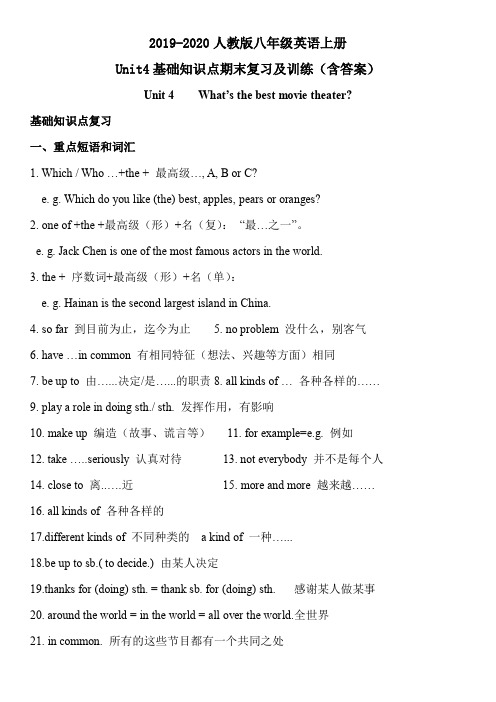
2019-2020人教版八年级英语上册Unit4基础知识点期末复习及训练(含答案)Unit 4 What’s the best movie theater?基础知识点复习一、重点短语和词汇1. Which / Who …+the + 最高级…, A, B or C?e. g. Which do you like (the) best, apples, pears or oranges?2. one of +the +最高级(形)+名(复):“最…之一”。
e. g. Jack Chen is one of the most famous actors in the world.3. the + 序数词+最高级(形)+名(单):e. g. Hainan is the second largest island in China.4. so far 到目前为止,迄今为止5. no problem 没什么,别客气6. have …in common 有相同特征(想法、兴趣等方面)相同7. be up to 由…...决定/是…...的职责8. all kinds of … 各种各样的……9. play a role in doing sth./ sth. 发挥作用,有影响10. make up 编造(故事、谎言等)11. for example=e.g. 例如12. take …..seriously 认真对待13. not everybody 并不是每个人14. close to 离..….近15. more and more 越来越……16. all kinds of 各种各样的17.different kinds of 不同种类的 a kind of 一种…...18.be up to sb.( to decide.) 由某人决定19.thanks for (doing) sth. = thank sb. for (doing) sth. 感谢某人做某事20. around the world = in the world = all over the world.全世界21. in common. 所有的这些节目都有一个共同之处二、重点句型1. one of +the +最高级(形)+名(复):“最…之一”。
人教版八年级英语上册知识点总结和复习要点
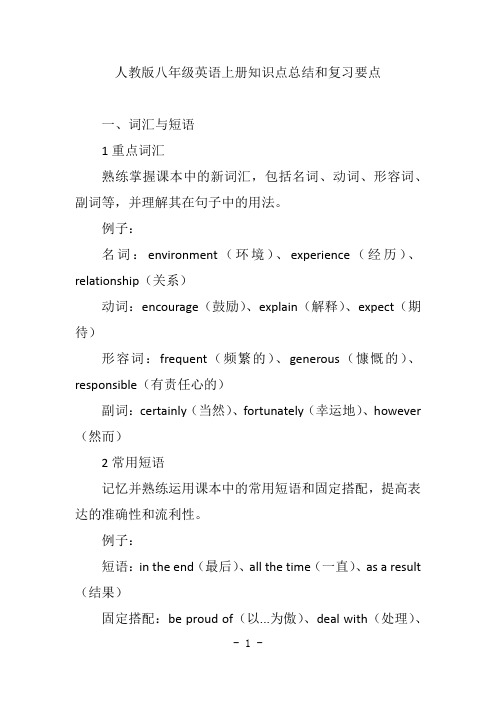
人教版八年级英语上册知识点总结和复习要点一、词汇与短语1重点词汇熟练掌握课本中的新词汇,包括名词、动词、形容词、副词等,并理解其在句子中的用法。
例子:名词:environment(环境)、experience(经历)、relationship(关系)动词:encourage(鼓励)、explain(解释)、expect(期待)形容词:frequent(频繁的)、generous(慷慨的)、responsible(有责任心的)副词:certainly(当然)、fortunately(幸运地)、however (然而)2常用短语记忆并熟练运用课本中的常用短语和固定搭配,提高表达的准确性和流利性。
例子:短语:in the end(最后)、all the time(一直)、as a result (结果)固定搭配:be proud of(以...为傲)、deal with(处理)、pay attention to(注意)二、句型与语法1基本句型熟练掌握五种基本句型,包括主语+谓语、主语+谓语+宾语、主语+谓语+间接宾语+直接宾语、主语+谓语+宾语+宾语补足语、主语+系动词+表语。
例子:主语+谓语:She sings.(她唱歌。
)主语+谓语+宾语:I like apples.(我喜欢苹果。
)主语+谓语+间接宾语+直接宾语:He gave me a book.(他给了我一本书。
)主语+谓语+宾语+宾语补足语:I found the book interesting.(我发现这本书很有趣。
)主语+系动词+表语:She is beautiful.(她很漂亮。
)2时态深入学习并掌握现在完成时、过去进行时、一般将来时、过去将来时等时态的用法和形式。
例子:现在完成时:I have already seen that movie.(我已经看过那部电影了。
)过去进行时:They were playing football when I called them.(我打电话给他们时,他们正在踢足球。
人教版八年级英语上册期末复习知识点总结

人教版八年级英语上册期末复习知识点总结Activities:(写出动词过去式)go on XXX去度假XXX at home待在家里go to the mountains去爬山go to the beach去海滩visit museums参观博物馆go to XXX去参观夏令营quite a few相当多study for为……而研究go out出去mostof the time大部分时间XXX good尝起来很好吃have a good time玩得高兴of course当然XXX给……的感觉;感受到XXXgo shopping去购物in the past在过去XXX四处走走because of因为one bowl of… 一碗……the next day第二天drink XXX喝茶find out找出;查明go on连续XXX photos照相XXX重要的事up e up出来不定代词有all。
each。
both。
either。
neither。
one。
none。
little。
few,many。
much。
other。
another。
some。
any。
no。
(a) few。
(a) little。
both,enough。
every等,以及由some。
any。
no和every构成的合成代词(即somebody。
anyone。
nothing等)。
在这些不定代词中,多数都能作主语、宾语、表语或定语,但是代词none以及由some。
any。
no和every构成的合成代词只能作主语、宾语或表语,不能作定语,而no和every则只用作定语。
复合不定代词:由some,any,no,every加上-body,-one,-thing组成的不定代词,叫做复合不定代词。
XXX某人something某物,某事anybody = XXX任何人XXX什么事物,任何事物,无论什么事物nobody = no one没有人,不重要的人nothing没有东西,什么也没有;不重要的人或事XXX XXX每人,人人,所有人everything每一个事物,统统词组:for nothing(徒劳,没有好结果,免费),nothing but(仅仅,只不过)。
人教版八年级上册英语期末复习语法知识点提纲

人教版八年级上册英语期末复习语法知识点提纲unit 11.something/anything / nothing /everything 用法* 不定代词+ adj something interesting * something“某事”用于肯定句,也用于表示建议或请求的问句中。
* anything表示“某事”用于否定句或疑问句中,表示“任何事”用if引导条件句中。
*nothing=not--anything表示用否定,everything表示“一切,全部,所有”2.辨析a few /few /little /a little*few, a few接可数名词复数,little, a little接不可数名词,形容词。
也可以修饰动词。
a few, a little表示肯定意思:有一些,有一点;few, little表示否定意思:“没有一些,没有一点”。
3.seem 用法* seem to do sth * it seems/seemed that从句* it is seemed that从句4.--ed形容词---ing形容词*ed 形容词主语是人,修饰人。
ing形容词主语是物,修辞物。
5.不同的“到达”*get to +地方,reach+地方,arrive in+大地方,arrive at+小地方home ,here,there 前不加介词。
6.decide用法* decide to do sth决定做某事make a decision做出决定decide on 在---做决定7.try用法* try to do sth 尽力做某事*try doing sth尝试做某事*try one’s best to do sth 尽某人最大努力做某事* try on /try it (them) on 试穿--*try out 尝试,实验* have a try 试一试8.wonder用法*后跟if引导宾语从句9.different用法*be different from 与---不同have many differences from--与--有不同之处10.辨析because / because of *because后跟从句,because of后跟名词(短语)11.enough * enough to do sth 足以做某事* 形容词/副词+enough 足够--- old enough 年龄足够大12.most用法*most+名词复数*the most of+复数名词---的大部分* the most+多音节形容词,最---13.辨析too many/ too much / much too* too many+可数名词复数,too much+不可数名词,much too+形容词14.wait用法*waiter 服务员*wait for 等待*can't wait to do sth 迫不及待做某事unit21.be good at doing sth擅长做某事2.be good for (doing) sth 对(做)某事有益处3.health用法*healthy 健康的keep/stay healthy 保持健康*unhealthy 不健康的* be in good health 处于健康状态4.surprise用法* in surprise 吃惊地to one’s surprise 让某人吃惊的是* surprised 感到吃惊的,修饰人be surprised at 对---感到吃惊* surprising 吃惊的,修饰物。
(人教版新目标)八年级英语上册全册各单元知识点期末总复习讲解教学课件

3. feel like “感受到;摸起来”,后跟宾语 从句或名词。 I felt like I was a bird. 我感觉我是一只鸟。 It feels like a stone. 它摸起来像一块石头。
eg.something special; somewhere wonderful. 2.不定代词做主语时,谓语动词用第三人称单数。 eg.Is everybody here? 大家都到齐了吗?
1. get to/reach/arrive 都是“到达“的意思。
get to+sp=reach+sp = arrive at+sp(小)=arrive in+sp(大) 若他们后面要加地点副词here, there, home等,则 不需要加介词。
25、up and down上上下下 26、come up出来 27、enjoy oneself=have fun=have a good time
玩的开心
二、重要句子(语法):
1.Where did you go on vacation? 你到哪里去度假了?
I went to New York City. 我去了纽约城。
三、习惯用法、搭配
1. buy sth. for ab./ buy sb. sth. 为某人买某物 2. taste + adj. 尝起来…… 3. nothing to do but do除了……之外无事可干 4. seem + (to be) + adj 看起来 5. arrive in + 大地方 / arrive at + 小地方 到达某地 6. decide to do sth=make a decision决定做某事 7. try doing sth. 尝试做某事
新人教版八年级上册英语全册期末复习必背知识点归纳
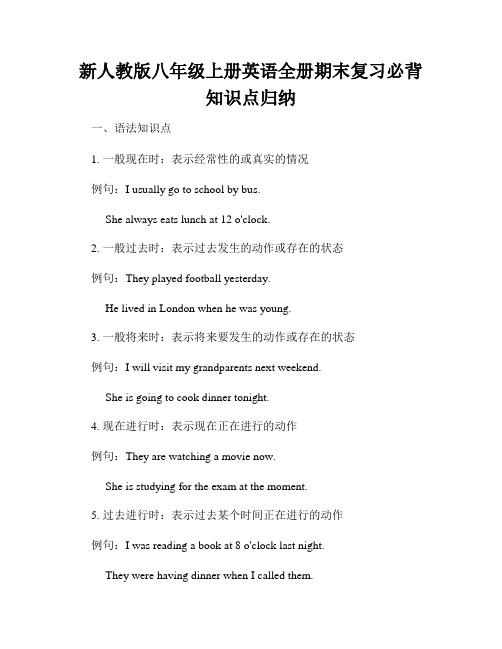
新人教版八年级上册英语全册期末复习必背知识点归纳一、语法知识点1. 一般现在时:表示经常性的或真实的情况例句:I usually go to school by bus.She always eats lunch at 12 o'clock.2. 一般过去时:表示过去发生的动作或存在的状态例句:They played football yesterday.He lived in London when he was young.3. 一般将来时:表示将来要发生的动作或存在的状态例句:I will visit my grandparents next weekend.She is going to cook dinner tonight.4. 现在进行时:表示现在正在进行的动作例句:They are watching a movie now.She is studying for the exam at the moment.5. 过去进行时:表示过去某个时间正在进行的动作例句:I was reading a book at 8 o'clock last night.They were having dinner when I called them.6. 情态动词 can 和 could:表示能力或许可例句:I can swim very well.He could speak three languages when he was young. 7. 情态动词 must 和 have to:表示义务、必须或强制性例句:You must finish your homework before going out.I have to wake up early tomorrow.8. 情态动词 should:表示建议或应该例句:You should eat more vegetables for better health. She should go to bed early for enough sleep.9. 动词不定式:表示目的、原因、结果或时态等例句:I went to the supermarket to buy some fruits.She is happy to hear the good news.二、词汇知识点1. 人称代词:用于代替特定人或物例句:He is my brother.They are good friends.2. 数词:表示数量的词语例句:There are ten students in the classroom.I have two cats and three dogs.3. 形容词:修饰名词或代词,描述人或物的特征例句:She is a beautiful girl.This is a big house.4. 副词:修饰动词、形容词、副词等,表示时间、地点、程度等例句:She runs fast.He speaks English fluently.5. 介词:介绍名词与其他词语之间的关系例句:I have a pen in my bag.The book is on the table.6. 连词:连接句子、词组或单词例句:I like swimming and playing basketball.She can play the guitar or the piano.7. 冠词:用于限定名词例句:I have an apple.The book on the table is mine.三、题型解析1. 完形填空题:根据上下文意思,选出合适的单词填空Tom: What's your favorite ________?Emily: I like watching ________.Tom: Me too. Let's go to the ________ tonight.A. colorB. movieC. sportD. book答案:B2. 阅读理解题:阅读短文,回答相关问题例题:My name is Lucy. I am twelve years old. I ________ to school every day. My favorite ________ is English. I like playing basketball ________ school. My dream is to become a ________ in the future.What does Lucy like playing?A. basketballB. soccerC. tennisD. volleyball答案:A3. 选择填空题:选择合适的单词或短语填空例题:Lucy: What's your ________ food, Tom?Tom: I like ________ because it tastes delicious.A. favoriteB. leastC. difficultD. easy4. 任务型阅读题:根据文章内容,完成相应的任务例题:请你根据短文内容,回答以下问题:What is the main idea of the passage?答案:The passage is about Lucy's daily life and her dream.四、写作技巧1. 写作时要注意使用适当的句式和词汇,使文章更加丰富多样。
(完整版)人教版八年级上册英语知识点汇总
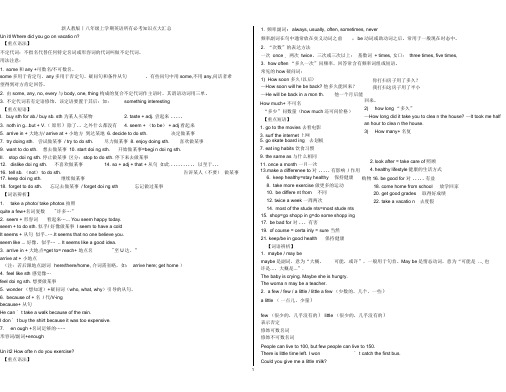
新人教版丨八年级上学期英语所有必考知识点大汇总Un itl Where did you go on vacatio n? 【重点语法】不定代词:不指名代替任何特定名词或形容词的代词叫做不定代词。
用法注意:1. some和any +可数名/不可数名。
some多用于肯定句,any多用于否定句、疑问句和条件从句。
有些问句中用some,不用any,问话者希望得到对方肯定回答。
2. 由some, any, no, every 与body, one, thing 构成的复合不定代词作主语时,其谓语动词用三单。
3. 不定代词若有定语修饰,该定语要置于其后:如:something interesting 【重点短语】I. buy sth for ab./ buy sb. sth 为某人买某物 2. taste + adj. 尝起来 .....3. noth in g...but + V.(原形)除了.. 之外什么都没有4. seem + (to be) + adj 看起来5. arrive in + 大地方/ arrive at + 小地方到达某地6. decide to do sth. 决定做某事7. try doing sth. 尝试做某事/ try to do sth. 尽力做某事8. enjoy doing sth. 喜欢做某事9. want to do sth. 想去做某事10. start doi ng sth. 开始做某事=begi n doi ng sth. II. stop doi ng sth. 停止做某事区分:stop to do sth. 停下来去做某事12. dislike doi ng sth. 不喜欢做某事14. so + adj + that + 从句如此.......... 以至于...16. tell sb. (not) to do sth. 告诉某人(不要)做某事17. keep doi ng sth. 继续做某事18. forget to do sth. 忘记去做某事/ forget doi ng sth 忘记做过某事【词语辨析】1. take a photo/ take photos 拍照quite a few+名词复数"许多…”2. seem + 形容词看起来…... You seem happy today. seem + to do sth. 似乎/ 好像做某事I seem to have a cold It seems + 从句似乎..….It seems that no one believe you. seem like ... 好像,似乎… .. It seems like a good idea.3. arrive in + 大地点=get to= reach+ 地点名"至U达. ”arrive at + 小地点(注:若后跟地点副词here/there/home, 介词需省略,如:arrive here; get home )4. feel like sth 感觉像…feel doi ng sth. 想要做某事5. wonder (想知道)+疑问词(who, what, why)引导的从句。
初中英语人教版八年级上册重点知识整理(1~3单元)

八年级英语上册重点知识整理Unit1 Where did you go on vacation?【重点语法】不定代词:不指名代替任何特定名词或形容词的代词叫做不定代词。
用法注意:1、some 和any+可数名/不可数名。
some 多用于肯定句,any多用于否定句、疑问句和条件从句。
有些问句中用some,不用any, 问话者希望得到对方肯定回答。
2、由some, any, no,every 与 body, one, thing构成的复合不定代词作主语时,其谓语动词用三单。
3、不定代词若有定语修饰,该定语要置于其后:如:something interesting【重点短语】1.buy sth for ab./ buy sb.sth 为某人买某物2.taste + adj.尝起来……3.nothing...but + V.(原形) 除了……之外什么都没有4.seem + (to be) + adj 看起来5.arrive in + 大地方 / arrive at + 小地方到达某地6.decide to do sth.决定做某事7.try doing sth.尝试做某事 / try to do sth.尽力做某事8.enjoy doing sth.喜欢做某事9.want to do sth.想去做某事10.start doing sth.开始做某事/ begin doing sth.11.stop doing sth.停止做某事区分:stop to do sth.停下来去做某事12.dislike doing sth.不喜欢做某事14.so + adj + that + 从句如此……以至于……16.tell sb.(not) to do sth.告诉某人(不要)做某事17.keep doing sth. 继续做某事18.forget to do sth.忘记去做某事 / forget doing sth 忘记做过某事【词语辨析】1.take a photo/ take photos 拍照2.seem + 形容词看起来…seem + to do sth.似乎/好像做某事It seems + 从句似乎..….It seems that no>seem like ...好像,似乎…3.arrive in +大地点= get to= reach+地点名“到达......”arrive at +小地点(注:若后跟地点副词here/there/home, 介词需省略,如:arrive here; get home)4.feel like sth 感觉像…feel doing sth.想要做某事5.wonder(想知道)+疑问词(who, what, why)引导的从句。
人教版八年级上册英语知识点总结

人教版八年级上册英语知识点总结人教版八年级上册英语知识点1. It’s +形容词 + for sb. + to do sth. 做某事对某人来说是…的。
It’s important to do sth. 做某事很重要。
It’s important for me to eat a balanced diet. 平衡饮食对我来说是很重要的.It’s easy to do sth. 做某事是容易的。
It’s easy for us to find out the answer. 找出答案对我们来说是容易的。
2. 情态动词should的用法should是情态动词,它的基本用法是必须和其他动词一起构成谓语。
意为"应该......"。
should(应当,应该)用于所有人称,表示劝告或建议。
eg. ---I have a very bad cold. 我感冒很厉害。
---You should lie down and have a rest. 你应该躺下,多喝水。
3. maybe与may be(1)maybe是副词,译为“也许、可能”,相当于“perhaps”。
如:Maybe he can answer the question. 也许他能回答那个问题。
He maybe is from the USA, too. 他可能也来自美国。
(2)may be中的may为情态动词,译为“可能是......”。
如:He may be from the USA, too. 他可能也来自美国。
She may be our English teacher. 她可能是我们的英语老师。
4. few、a few、little、a little的区别和联系:(1)few / a few用来修饰可数名词,few表示否定意义,没有,几乎没有;a few表示肯定意义,有几个。
例如:He has few friends here, he feels lonely. 他这里没朋友,他感觉寂寞。
2020年人教版八年级上册英语期末复习重点语法知识点梳理

2020年人教版八年级上册英语【期末复习】重点语法知识点梳理Unit1 Where did you go on vacation?本单元的话题:谈论假期活动内容,复习一般过去时。
本单元的语法:1.复习一般过去时;2.学习不定代词和不定副词的用法。
【重点语法】不定代词:不指名代替任何特定具体名词或形容词的代词叫做不定代词。
1. some 和any +可数名词/ 不可数名词。
some 多用于肯定句,any多用于否定句、疑问句和条件从句。
2. 不定代词的分类人:someone、somebody、anyone、anybody , no one、none、nobody、everyone、everybody物:something anything nothing everything地点:somewhere anywhere nowhere everywhere3. 不定代词若有定语修饰,该定语要置于其后,即不定代词+adj如:something interesting4. 不定代词/ 副词作主语时,谓语动词用单数形式。
eg. Something is wrong with my computer.5. 疑问句表达“请求、建议”, 问话者希望得到对方肯定回答时,用some, 不用any。
句中some、something等不用改为any、anything。
Unit2 How often do you exercise?本单元的话题:谈论生活习惯,复习一般现在时。
本单元的语法:1.复习一般现在时;2.学习表示频率副词的用法。
【重点语法】1. 频率副词: always, usually, often, sometimes, hardly, never频率副词在句中通常放在实义动词之前, be动词或助动词之后。
常用于一般现在时态中。
2.“次数”的表达方法一次once,两次twice,三次或三次以上:基数词+ times, 如:three times, five times, 3. how often“多久一次”问频率,回答常含有频率词组或短语。
初二英语知识点总结归纳上册人教版
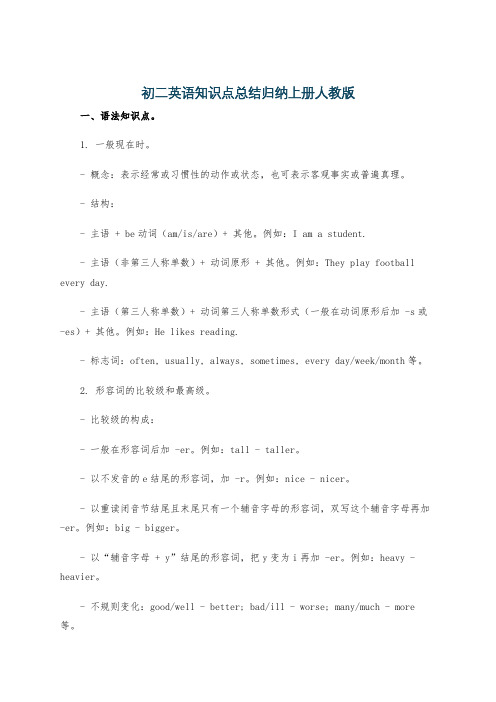
初二英语知识点总结归纳上册人教版一、语法知识点。
1. 一般现在时。
- 概念:表示经常或习惯性的动作或状态,也可表示客观事实或普遍真理。
- 结构:- 主语 + be动词(am/is/are)+ 其他。
例如:I am a student.- 主语(非第三人称单数)+ 动词原形 + 其他。
例如:They play football every day.- 主语(第三人称单数)+ 动词第三人称单数形式(一般在动词原形后加 -s或-es)+ 其他。
例如:He likes reading.- 标志词:often, usually, always, sometimes, every day/week/month等。
2. 形容词的比较级和最高级。
- 比较级的构成:- 一般在形容词后加 -er。
例如:tall - taller。
- 以不发音的e结尾的形容词,加 -r。
例如:nice - nicer。
- 以重读闭音节结尾且末尾只有一个辅音字母的形容词,双写这个辅音字母再加-er。
例如:big - bigger。
- 以“辅音字母 + y”结尾的形容词,把y变为i再加 -er。
例如:heavy - heavier。
- 不规则变化:good/well - better; bad/ill - worse; many/much - more 等。
- 比较级的用法:- 表示两者之间的比较,常用结构“比较级+than”。
例如:He is taller than me.- 最高级的构成:- 一般在形容词后加 -est。
例如:tall - tallest。
- 以不发音的e结尾的形容词,加 -st。
例如:nice - nicest。
- 以重读闭音节结尾且末尾只有一个辅音字母的形容词,双写这个辅音字母再加-est。
例如:big - biggest。
- 以“辅音字母 + y”结尾的形容词,把y变为i再加 -est。
例如:heavy - heaviest。
最全面人教版八年级上册英语期末总复习归纳整理
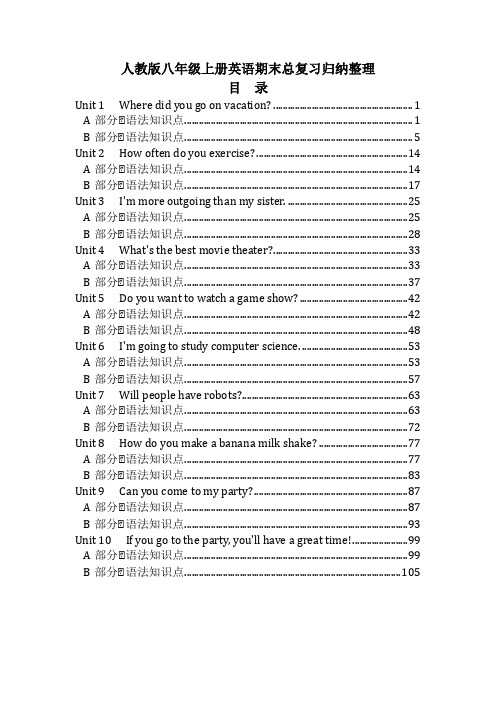
人教版八年级上册英语期末总复习归纳整理目录Unit 1 Where did you go on vacation? (1)A部分━语法知识点 (1)B部分━语法知识点 (5)Unit 2 How often do you exercise? (14)A部分━语法知识点 (14)B部分━语法知识点 (17)Unit 3 I'm more outgoing than my sister. (25)A部分━语法知识点 (25)B部分━语法知识点 (28)Unit 4 What's the best movie theater? (33)A部分━语法知识点 (33)B部分━语法知识点 (37)Unit 5 Do you want to watch a game show? (42)A部分━语法知识点 (42)B部分━语法知识点 (48)Unit 6 I'm going to study computer science. (53)A部分━语法知识点 (53)B部分━语法知识点 (57)Unit 7 Will people have robots? (63)A部分━语法知识点 (63)B部分━语法知识点 (72)Unit 8 How do you make a banana milk shake? (77)A部分━语法知识点 (77)B部分━语法知识点 (83)Unit 9 Can you come to my party? (87)A部分━语法知识点 (87)B部分━语法知识点 (93)Unit 10 If you go to the party, you'll have a great time! (99)A部分━语法知识点 (99)B部分━语法知识点 (105)Unit 1 Where did you go on vacation?A部分━语法知识点(1)复合不定代词的用法1、复合不定代词只相当于名词,在句子中可作主语、宾语、表语,不能作定语(即不具有形容词的性质)。
人教版英语八年级上册笔记

人教版英语八年级上册笔记一、课程概述人教版英语八年级上册是在学生已经掌握了一定的英语基础知识后,进一步提高学生的英语应用能力。
本册教材重点培养学生的阅读理解能力,同时注重听说写各方面的训练,为学生后续的英语学习打下坚实的基础。
二、重点语法现在完成时:这个时态主要用于表示过去发生的动作对现在造成的影响或结果,也可以表示过去的动作一直持续到现在。
其基本结构为“have/has + 过去分词”。
例如:I have finished my homework. (我已经完成了作业。
)被动语态:被动语态是英语中常用的一种语态,主要用于描述主语是动作的接受者。
其基本结构为“be + 过去分词”。
例如:The book was written by him. (这本书是由他写的。
)情态动词:情态动词是英语中表示可能性、必要性和意愿的动词,如“can”, “should”, “must”等。
例如:You should finish your homework on time. (你应该按时完成作业。
)三、重点词汇和短语important:重要的difficult:困难的bored:厌烦的excited:兴奋的terrified:害怕的worried:担心的lonely:孤独的anxious:焦虑的successful:成功的confident:自信的四、重点句型It is + 形容词+ to do sth. (做某事是……的)It takes sb. some time to do sth. (花费某人多长时间做某事)There is no need to do sth. (没有必要做某事)It is said that…(据说……)It is a good idea to do sth. (做某事是个好主意)It is better to do sth. than to do sth. else. (做某事比做其他事更好)It is + 数字+ percent + that + 从句(百分之……的是……)It is time for sb. to do sth. (是某人做某事的时间了)It is the first/second/last time that sb. have/has done sth. (是某人第几次做某事)It is important/necessary/urgent/fantastic/useful/essential that sb. do sth.(某事是很重要的/必要的/紧急的/极好的/有用的/基本的)五、阅读理解技巧快速阅读全文,理解文章大意。
(完整版)最新人教版八年级英语上册知识点总结(全),推荐文档

see 既可做及物动词后接宾语,又可用做不及物动词,着重于看 的后果,即“看到,看见”。
read 多指“看书、报”,这里的“看”实为“读”,可用做及物动词 或不及物动词。
watch 用做及物动词,用来指非常仔细地、有目的和特意的动作, 表示“注视,观看,监视”之意。也常用于“看电视,看比赛”等短语中。
7
7、 once a week/ twice a week
once“一次”,twice“两次”,在英语中三次或三次以上通常用“基 数词+times”表示,time 在这里为可数名词,意为“次数”,复数加 s。
I wash my face twice a day.
我每天洗两次脸。
He has been there four times.
hard 作副词时常用来表示程度,意为“努力地;猛烈地;剧烈地”
。
2
This ground is too hard to dig. They tried hard to succeed.
这块地太硬,挖不动。 他们努力工作,以求得成功。
2)hardly 是表频率的副词,意为“几乎不;几乎没有”,相当于 almost not。
There is hardly any coffee left.= There’s almost no coffee left. 几乎没有剩余的咖啡了。
(3)sometimes、sometime、some time 和 some times
单词 词义
用法
sometim 有时 es
用于一般现在时和一般 过去时中
她长大了,能够照顾
【拓展】
look at=have a look at 看…
look over 检查
2020最新人教版八年级上册英语期末复习知识点汇总.
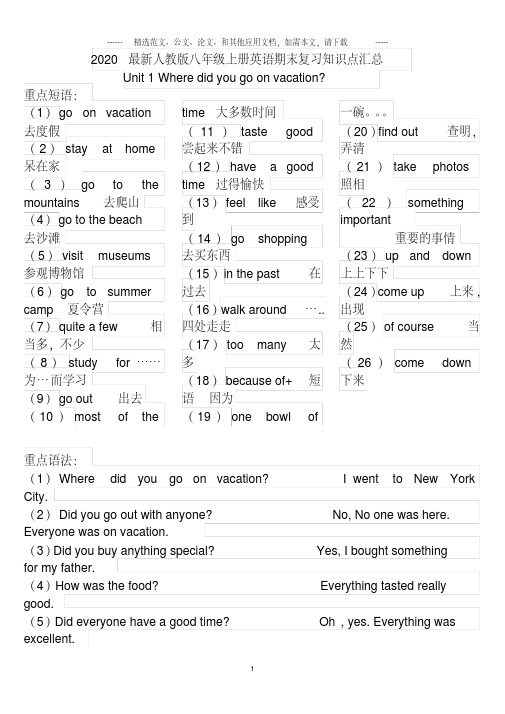
( 28 )more than 多 sth 必须做某事
擅长做某事
于
( 35 ) get in … 进入 …
( 23 ) go camping
( 29 ) old habits die ( 36 ) be late for
迟
去野营
hard
到
( 24 ) in one ’s free
旧习难改
time
( 30 ) less than 少
I always exercise. They often help my
She sometimes goes I go to the movies
He hardly ever watches No, I never go
习惯用法:
1. help sb. with sth = have sb do
4. How many + 可数名词复数 +
------ 精选范文、公文、论文、和其他应用文档,如需本文,请下载
-----
2020 最新人教版八年级上册英语期末复习知识点汇总
Unit 1 Where did you go on vacation?
重点短语:
(1 ) go on vacation time 大多数时间
一碗。。。
去度假
( 11 ) taste good ( 20 )find out 查明,
too much 太多,修饰不可数名
事的乐趣
Unit 2
短语:
(1 )help sb with sth
帮助某人做某事
(2 ) go shopping 去
买东西
( 3 ) on weekends
在周末
- 1、下载文档前请自行甄别文档内容的完整性,平台不提供额外的编辑、内容补充、找答案等附加服务。
- 2、"仅部分预览"的文档,不可在线预览部分如存在完整性等问题,可反馈申请退款(可完整预览的文档不适用该条件!)。
- 3、如文档侵犯您的权益,请联系客服反馈,我们会尽快为您处理(人工客服工作时间:9:00-18:30)。
2020最新人教版八年级上册英语期末复习知识点汇总Unit 1 Where did you go on vacation?重点短语:(1)go on vacation 去度假(2)stay at home 呆在家(3)go to the mountains 去爬山(4)go to the beach 去沙滩(5)visit museums 参观博物馆(6)go to summer camp 夏令营(7)quite a few 相当多,不少(8)study for……为…而学习(9)go out 出去(10)most of the time大多数时间(11)taste good尝起来不错(12)have a goodtime过得愉快(13)feel like 感受到(14)go shopping去买东西(15)in the past 在过去(16)walk around…..四处走走(17)too many 太多(18)because of+短语因为(19)one bowl of一碗。
(20)find out 查明,弄清(21)take photos照相(22)somethingimportant重要的事情(23)up and down上上下下(24)come up 上来,出现(25)of course 当然(26)come down下来重点语法:(1)Where did you go on vacation? I went to New York City.(2)Did you go out with anyone? No, No one was here. Everyone was on vacation.(3)Did you buy anything special? Yes, I bought something for my father.(4)How was the food? Everything tasted really good.(5)Did everyone have a good time? Oh,yes. Everything was excellent.习惯用法:(1)buy sth for sb./ buy sb. sth 为某人买某物(2)taste + adj. 尝起来……(3)nothing ….but + V.(原形) 除了…之外什么都没有(4)seem + (to be) + adj 看起来(5)arrive in + 大地方arrive at + 小地方到达某地(6)decide to do sth. 决定做某事(7)try doing sth. 尝试做某事(8)try to do sth. 尽力做某事(9)try one`s best to do sth尽力做某事(10)enjoy doing sth. 喜欢做某事(11)want to do sth. 想去做某事(12)start doing sth. 开始做某事(13)stop doing sth. 停止做某事stop to do sth 停下来做某事(14)look + adj 看起来(15)dislike doing sth. 不喜欢做某事(16)Why not do sth. 为什么不做…….呢?(17)so + adj + that + 从句如此…以至于(18)tell sb. (not) to do sth. 告诉某人(不要)做某事(19)keep doing sth. 继续做某事(20)forget to do sth. 忘记去做某事(未做)forget doing sth忘记做过某事(已做)词语辨析:○1. anywhere 与somewhere 两者都是不定副词。
anywhere 在任何地方(否定句和疑问句)I can’t find it anywhere. somewhere 在某处,到某处,常用于肯定句。
I lost my key somewhere near here.○2seem + 形容词看起来…..You seem happy today. seem + to do sth. 似乎、好像做某事I seems / seemed + that来好像…;似乎….seem like ….好像,似乎…..It seems like a god idea.○3. decide to do sth.决定做某事They decide to visit the museum.decide + 疑问词+ 动词不定式He can not decide when to leave.○4. start doing sth = start to do sth. 开始He started doing his homework.○5. over 多于,超过,在…以上(表示数目、程度)= more thanMy father is over 40 years old. ○6. too many 太多,后接可数名词复数:Mother bought too many eggs yesterday.too much 太多,修饰不可数名词We have too much work to do. Don’t talk too much.○7. because of 因为,由于,接名词、代词或动名词He can’t take a walk because of the rain.because 连词,因为,引导状语从句I don’t buy it because it was too expensive.○8. too,…to 太….以至于不能…. Mother is too tired to go to school.○9. have fun doing sth 享受做某事的乐趣Unit 2 How often do you exercise? 短语:(1)help sb with sth 帮助某人做某事(2)go shopping去买东西(3)on weekends 在周末(4)how often 多少次(5)hardly ever 几乎从不(6)once a week 一星期一次(7)twice a month 一个月两次(8)go to the movies 去看电影(9)every day 每天(10)use theInternet上网(11)be free=benot busy=have time有空(12)have dancelesson(13)swing dance摇摆舞(14)play tennis 打网球(15)stay up late熬夜到很晚(16)go to sleep睡觉(17)go to bed 上床睡觉(18)at least 至少,不少于(19)go to bed early 上床睡觉早(20)play sports 做运动(21)be good for 对….有好处(22)be good at doing sth擅长做某事(23)go camping 去野营(24)in one’s free time在某人的业余时间(25)the mostpopular 最受欢迎(26)such as 例如….像….这样(27)go to thedentist看牙科医生(28)more than 多于(29)old habits diehard旧习难改(30)less than 少于(31)junk food 垃圾食品(32)take care of sb照料某人(33)look after sb照顾某人(34)have to dosth必须做某事(35)get in…进入…(36)be late for 迟到语法要点:(1)What do you usually do on weekends? I always exercise. (2)What do they do on weekends? They often help my mother with housework.(3)What does she do on weekends? She sometimes goes shopping.(4)How often do you go to the movies? I go to the movies maybe once a month.(5)How often does he watch TV? He hardly ever watches TV.(6)Do you go shopping? No, I never go shopping.习惯用法:1. help sb. with sth=have sb do sth帮助某人做某事2. How about doing…? ….怎么样?/ ….好不好?3. want sb. to do sth. 想让某人做某事4. How many + 可数名词复数+ 一般疑问句5. 主语+ find+ that 从句发现…6. It’s + adj.+ to do sth. 做某事是….的7. spend time with sb. 和某人一起度过时光8. ask sb. about sth. 向某人询问某事9. by doing sth. 通过做某事10. What’s your favorite…..?你最喜欢的…是什么?11 start doing sth. 开始做某事12. the best way to do sth. 做某事的最好方式13.full of 满的14.what about doing sth ?做某事怎么样?15.not….at all 一点儿也不I don`t like it at all. 我一点儿也不喜欢它。
词语辨析:1.free 空闲的,有空的,反义词为busy.be free 有空,闲着,相当于have time.I’ll be free next week. = I’ll have time next week.2.How come?怎么会?怎么回事?How come Tom didn’t come to the party?= Why didn’t Tom come to the party?3.stay up late 指“熬夜到很晚,迟睡”。
Don’t stay up late next time.stay up 指“熬夜,不睡觉”。
He stayed up all night to write his story.4.go to bed 上床睡觉I went to bed at eleven last night.go to sleep 强调“入睡,睡着,进入梦乡”。
